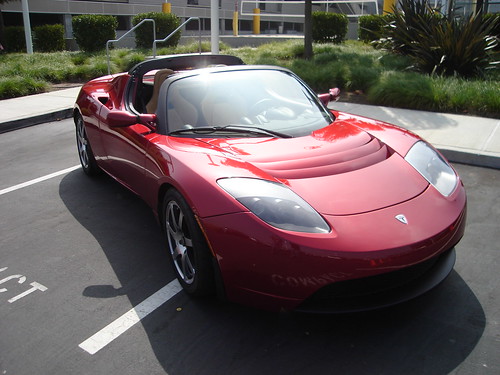There's an interesting little conflict brewing in the world of high end motoring. It provides an interesting example of the fine line between entertainment and journalism, not to mention an example of attempted PR misdirection.
In one corner is Top Gear, the British car guy show that's become a sensation in the States thanks to BBC America (and, of course, YouTube). It's a show that, thanks to the wit and cynicism of the hosts, has fans beyond the realm of traditional "car guys" (like my boss, for instance). They routinely bad mouth cars they test, especially American ones, although you can read between the lines and get a bit of respect from them in most cases.
In the other corner is Tesla Motors, a California company that builds electric cars. Unlike the old EV-1 or modern hybrids, Tesla is building a roadster that car guys might actually want to drive (photo by):
Look familiar? It's based on the Lotus Elise, one of the most desired sports cars in the world. All that and electric power - what's not to love!
The issue betwixt Tesla and Top Gear arose after the show's test of the Tesla was broadcast in the UK. It probably won't make it to BBC America for a while, but you can view it here now. As the New York Times auto blog puts it:
In the segment, Jeremy Clarkson, one of the show’s three hosts, flogs a Tesla around a test track – to whoops and hollers – until the car slows down and unexpectedly stops. Mr. Clarkson looks at the camera, seemingly befuddled. He and three others are forced to push the car into a warehouse for a battery recharge. At least that’s what the video seems to show.It didn't. Tesla claims the segment is misleading by suggesting that it did. Data obtained from the two cars Tesla loaned the show demonstrates that neither ran out of juice. Top Gear shoots back that that portion of the report was designed to show what would happen in the event the car ran out of juice and what a pain in the rump that would be.
“Although Tesla says that it does 200 miles, we worked out that on our test track, it would run out after just 55 miles,” Mr. Clarkson says in a voice-over.
But did the car actually run out of juice?
Who's got the better argument? Having watched the test, I think it's edited quickly enough and moves onto the problems of charging and such that Top Gear is in the clear. What happens when the car runs out of power is something that needs to be covered in any review, as it's different from running out of gas/diesel in a regular car. That the charging process hampers the car's everyday driveability is very relevant to any review.
Top Gear (or at least some its fans) also hides behind the "we're not journalists, we're entertainers" defense, which is pretty lame. Certain things about car reviews will always be subjective. But others aren't, such as whether the car broke or otherwise failed during a test. I don't think the test reads that way, honestly, but if it did the "lighten up, it's all fun and games" defense is pretty weak.
If you watch all of the review, you can see why Tesla decided to harp on the impression that the car ran out of juice. Both of the cars Top Gear had developed terminal mechanical problems: one had brake issues, the other suffered from overheating. Neither reflects well on the company and neither (to my knowledge) had been refuted by them. Better, then, to scream and waive hands over something else to distract from the real issues.
FWIW, Top Gear fans, here's The Stig whipping the Tesla around the test track as quickly as a Porsche 911 GT3! Not bad.









2 comments:
Top Gear is an occasional guilty pleasure of mine (and that's coming from a guy who remembers how dry, finicky and boring it was in the 80s), but I was momentarily shocked and disappointed that a show that - by its own admission - reviews cars would fake something like that, even if it was all in the name of entertainment. TG is a pretty influential show, out and out lying about a car's performance might be chuckleworthy, but it could also seriously damage sales and reputations.
But then I re-read Clarkson's quote from the article, "Although Tesla says that it does 200 miles, we worked out that on our test track, it would run out after just 55 miles."
It *would* run out after 55 miles. Not that it *did*, only that it *would*. So even though their test data shows that the cars didn't stall, Top Gear are telling the truth and even go so far as to say "we worked out", despite the reconstruction.
Tesla are making too much out of this. And their car is ugly. THAT is one of the most desired cars in the world? Really?
THAT is one of the most desired cars in the world? Really?
Not the Tesla, the Elise, upon which it's based. The basic sillouette is the same, but the Elise cuts a more dashing form. It also weighs next to nothing, handles like a go-kart, and is one of the only 2-seat sports cars in which I fit.
Post a Comment